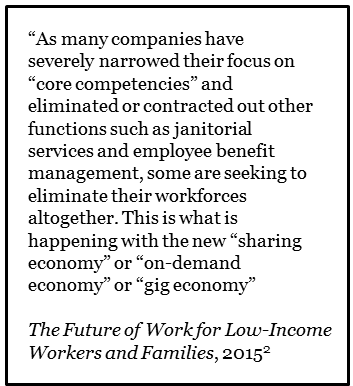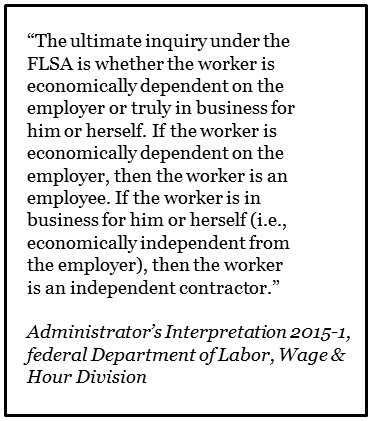Joint Standing Committee on Labor, Commerce, Research and Economic Development
February 2, 2016
James Myall, Maine Center for Economic Policy
for a PDF version of this testimony, click here.
Good afternoon, Senator Volk, Representative Herbig, and the members of the Joint Committee on Labor, Commerce, Research and Economic Development. I am James Myall, a policy analyst with the Maine Center on Economic Policy, and I appear to testify in opposition to LD 1553, “An Act to Improve the Workers’ Compensation System.”
The proposal to move the authority to determine whether a worker is an employee or an independent contractor from the Workers’ Compensation Board to the Commissioner of Insurance represents a shift of power from individual workers, represented by the labor membership on the board, to a political appointee of the Governor. Not only does the move silence the voice of working Mainers in the decision, it also risks overturning the existing consensus-driven process between workers and management representatives on the board in favor of partisan decision-making.
 Determination of independent contractor status is an issue of increasing importance in the 21st-century workplace. In 2005, the last time the U.S. Census Bureau collected data on the topic, some 30% of American workers were part of the “contingent workforce”, which includes 24% of workers who were classified as independent contractors.1 Since then, however, this number has almost certainly increased. A study by the accounting firm Intuit estimates that by 2020, the share of all American workers engaged in contingent work will have increased from 30% to 40%.3 One of the impacts of the Great Recession of 2008 was to make American workers, including Mainers, more dependent on part-time and contract work. The rise of the so-called “sharing” or “gig economy”, in which individuals negotiate directly with consumers for jobs, has placed workers in an unusual position. People who find work through apps like Uber and Lyft, or undertake crowdsourcing for companies like Amazon Turk, are routinely classified as independent contractors by the companies involved,4 which absolves these businesses from the duty to pay state and federal taxes, workers’ compensation insurance, or provide benefits like healthcare plans. This represents an unfair competitive advantage for these companies, and simply shifts these costs from businesses onto the individual, and, often, the state, as tax revenues decline and the workers find themselves in need of services like MaineCare and the Supplemental Nutrition Assistance Program.
Determination of independent contractor status is an issue of increasing importance in the 21st-century workplace. In 2005, the last time the U.S. Census Bureau collected data on the topic, some 30% of American workers were part of the “contingent workforce”, which includes 24% of workers who were classified as independent contractors.1 Since then, however, this number has almost certainly increased. A study by the accounting firm Intuit estimates that by 2020, the share of all American workers engaged in contingent work will have increased from 30% to 40%.3 One of the impacts of the Great Recession of 2008 was to make American workers, including Mainers, more dependent on part-time and contract work. The rise of the so-called “sharing” or “gig economy”, in which individuals negotiate directly with consumers for jobs, has placed workers in an unusual position. People who find work through apps like Uber and Lyft, or undertake crowdsourcing for companies like Amazon Turk, are routinely classified as independent contractors by the companies involved,4 which absolves these businesses from the duty to pay state and federal taxes, workers’ compensation insurance, or provide benefits like healthcare plans. This represents an unfair competitive advantage for these companies, and simply shifts these costs from businesses onto the individual, and, often, the state, as tax revenues decline and the workers find themselves in need of services like MaineCare and the Supplemental Nutrition Assistance Program.
Some people genuinely participate in the “gig economy” as a means of supplementing their existing income, but for many, it’s an economic necessity. Even for some of those who have a main job as a traditional employee, the extra income from the gig economy work may be essential to their family economy. Yet we know that workers in this part of the economy earn less, and have no access to crucial employer-provided benefits. When these workers are left without employer-provided healthcare, hospitals or MaineCare pick up the tab; when these workers are paid at a lower rate than their salaried or wage-earning peers, they rely on TANF and SNAP to make up the difference. And when these workers are injured on the job – a particular concern for taxi drivers and construction workers, who make up a large share of this industry – the last thing they need is to be faced with a substantial medical bill. Misclassification of workers causes real hardship to those workers and their families, and ultimately places more burden on towns and the state.
 Tech startups like Uber have gained the most attention in recent months, but they are not unique in stretching rules regarding independent contractor classification. Even before the Recession (in 2007), the Maine Department of Labor found 41% of audited companies were not in compliance with the current state standards. It would be reasonable to expect that number to be at least as high, with the bargaining power of workers in the marketplace reduced by the economic crash and slow recovery.
Tech startups like Uber have gained the most attention in recent months, but they are not unique in stretching rules regarding independent contractor classification. Even before the Recession (in 2007), the Maine Department of Labor found 41% of audited companies were not in compliance with the current state standards. It would be reasonable to expect that number to be at least as high, with the bargaining power of workers in the marketplace reduced by the economic crash and slow recovery.
The federal Department of Labor’s (DoL) Wage and Hour Division, recognizing the growing importance of this issue, produced new (non-binding) guidelines in 2015 to urge states to place primary emphasis on the “economic realities factors” – i.e., if a worker is economically dependent on the employer, they are an employee.5 In order to facilitate its enforcement of the Fair Labor Standards Act and reduce the misclassification of workers, the federal DoL has entered into memoranda of understanding with 28 states. New Hampshire and Vermont both signed memoranda in 2015; leaving Maine as the only New England state not to have signed such an agreement.
The bill under consideration would remove the voice of Mainers from any future changes to the determination of employee status for workers’ compensation purposes. That determination, and its enforcement, is becoming increasingly important to the welfare of working Mainers. Misclassification, either deliberate or as a result of loopholes in the determination criteria, makes for an unfair business environment, lower state revenues, and reduced economic security for working Mainers.
References:
- US Census Bureau, Current Population Survey, Contingent Workers Supplement, February 2005. MECEP Analysis
- The Future of Work for Low-Income Workers and Families, Working Poor Families Project, Fall/Winter, 2015
http://www.workingpoorfamilies.org/wp-content/uploads/2015/12/WPFP-Fall_Winter-2015-Brief.pdf
- Intuit 2020 Report: Twenty Trends that Will Shape the Next Decade, Intuit, October 2010, pp20-21
http://http-download.intuit.com/http.intuit/CMO/intuit/futureofsmallbusiness/intuit_2020_report.pdf
- Stretching the Law II: The Misclassification of Employees as Independent Contractors, Bureau of Labor Education, University of Maine, Spring 2009
- Administrator’s Interpretation 2015-1, Federal Department of Labor, Wage & Hour Division, http://www.dol.gov/whd/workers/Misclassification/AI-2015_1.pdf


